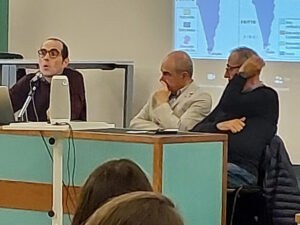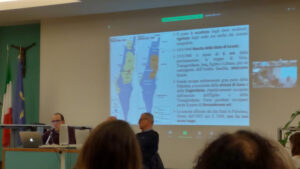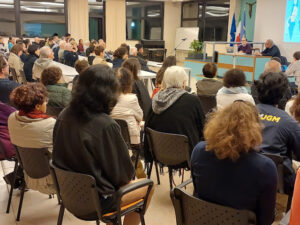We are all living difficult days. In addition to the Russian-Ukrainian war, that has been a sword of Damocles for the whole of humanity for more than a year and a half, since 7th October we have been witnessing unprecedented violence in a handkerchief of land: Israel. What is the Promised Land par excellence has become within Israeli kibbutzim, first, and the Gaza Strip, now, a place where blood flows. Moreover, we know that blood unites all human beings without differences between ethnicities, cultures, religions. Human blood belongs to Jews and Muslims, in particular, but in recent days also to Christians. We are all involved in this conflict that risks degenerating, spreading to neighboring countries, and ending up in a real world war.
Rarely in life have I found myself in such difficulty as I have in these days. The immense pain caused by what has happened and is happening has polarized feelings and, often, even the most noble ones. We were all horrified and appalled by what happened on 7th October: unprecedented, gratuitous, senseless and unapologetic violence. But so, at least, are we, in the face of what we are seeing these days: a people reduced to starvation, as well as progressively falling victim to attacks that, although targeted at those who originated the violence, claim victims among all, including innocent people, with hundreds of children who have already lost their lives. Yet, the absurdity of this situation also makes it difficult to express solidarity these days, because the polarization that has been created pushes everyone to demand an absolute and exclusive form of solidarity. Being in solidarity with one side means discriminating against the other. In addition, this is a great suffering when one has friends and friends, and perhaps more so, brothers and sisters, on both sides. Perhaps the suffering this creates in many of us gives us the opportunity to share in the great sorrows that many are experiencing in that part of the world and beyond.
Still, the signs matter. They may be small things, but the drops make the ocean, and relationships are crucial in these moments. A few days ago, I posted a blog (https://whydontwedialogue.blogspot.com/2023/10/visita-alla-sinagoga-mattinata-in-nome.html) about the visit that I and my students (and some Sophia professors) made to the synagogue in Florence. However, at the same time some Sophia professors and students were connected with the International Islamic University of Malaysia in Kuala Lampur for a seminar on ecology and spiritual values in Islam and Christianity. 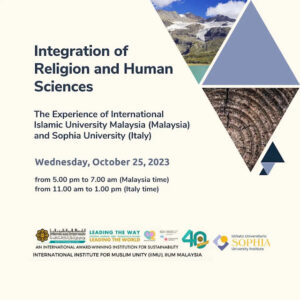 At the same time, our small university was engaged with Jewish and Muslim speakers. In both contexts, there were Palestinian students who, according to them, experienced a moment of hope and fraternity. I must be honest.
At the same time, our small university was engaged with Jewish and Muslim speakers. In both contexts, there were Palestinian students who, according to them, experienced a moment of hope and fraternity. I must be honest. 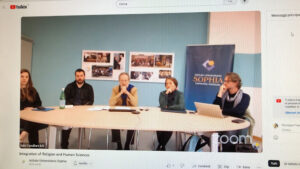 The two appointments – at the synagogue and with the Islamic university – had been planned for some time, but it was very significant for us that these commitments were kept, which meant a testimony of dialogue and peace, as well as cultural and religious sharing. In fact, even the seminar held with the Malaysian university focused on the religious dimension of ecology, perhaps better said the dimension of spiritual values.
The two appointments – at the synagogue and with the Islamic university – had been planned for some time, but it was very significant for us that these commitments were kept, which meant a testimony of dialogue and peace, as well as cultural and religious sharing. In fact, even the seminar held with the Malaysian university focused on the religious dimension of ecology, perhaps better said the dimension of spiritual values. 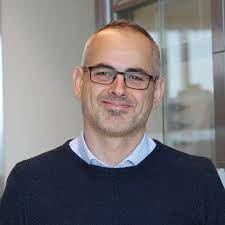 The Christian speaker, Prof. Nino Puglisi, called Prof. Waleed Faris’ talk ‘fascinating’. He spoke about the ecological and environmentalist perspective of the Muslim mystic al-Ghazali who lived in the 11th century.
The Christian speaker, Prof. Nino Puglisi, called Prof. Waleed Faris’ talk ‘fascinating’. He spoke about the ecological and environmentalist perspective of the Muslim mystic al-Ghazali who lived in the 11th century.
For his part, Puglisi presented the Christian position, sharing reflections on Laudato sii and Pope Francis’ recent Laudate Deum. A passionate and very positive dialogue followed. “It seemed to me that our conversation converged on several points, in particular on the vision of the spiritual and theological understanding that underlies our ecological action,” says Dr. Puglisi in a post on his blog (https://wine.water.blog/2023/10/29/integration-of-religion-and-human-sciences/). Puglisi states that ‘in both traditions, nature emerges as a sacred reality that carries with it a spiritual and metaphysical meaning that points beyond itself, ultimately to God. The shared vision of Al Ghazali and Pope Francis on nature has convinced me even more that only by redefining the reference of the cosmos to God is it possible to overcome the dramatic opposition between human beings and nature in which we seem to be stuck as a culture and shape a new spiritual environmentalism that could motivate many.”
In the meantime, terrible events were unfolding before our eyes. Therefore, out of a desire absolutely shared by both students and teachers, an evening of reflection and knowledge on the current situation was organized. This was done to give those who wished to know more an opportunity to learn about the background to what is happening in the Middle East. The program included a two-part historical tour by two lecturers from our university. This was followed by testimonies from people on the ground or in neighboring countries, who are waiting with bated breath to see how events unfold. Finally, one of our Palestinian students gave a touching personal testimony. I had the not easy task of moderating this session. Right from the start, I made it clear one point. For those who were present (about eighty in attendance in addition to 140 listening points in different parts of Italy and the world) it would have been difficult to fully understand the dramatic situation being experienced in those lands and in the souls of millions of men and women who, albeit in different ways, are experiencing the same drama. The most positive conclusion could have been to leave the room and the connection with the awareness that it is impossible to truly understand what is happening and this, above all, for westerners and, in general, for those who live far from the theatre of this unprecedented violence. This moment, too, was an important step towards becoming aware together of many unknown aspects – or those silenced by the media – of a very complex, as well as tremendously painful, situation.
As you can see, we are engaging in what, we are aware, are small steps, but often, in such circumstances, none of us can do great things except sow peace and build positive relationships with those around us. Let us continue in the constant effort to share human and spiritual closeness and prayers with all those who suffer from what has happened or is happening, knowing that the games that cause these situations and bring humanity to the brink of world war escape the ordinary people who only pay the price. It is worth remembering an important phrase that both Jewish and Muslim traditions often repeat and that all men and women part of humanity cannot but share: ‘whoever saves one person saves humanity’ but it is also true that ‘whoever kills one person kills humanity’.
A recording of the seminar is available on the Sophia IUS YouTube channel: https://www.youtube.com/watch?v=h2S9KV7GsVw
https://whydontwedialogue.blogspot.com/2023/11/dialogare-fra-polarizzazione-e.html?m=1